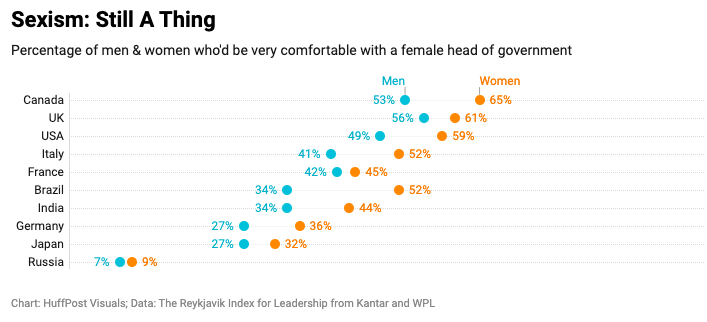Both men and women aren’t totally cool with women running the show.
Gender is still a barrier to see a women elected as President of the United States, at least that’s what the Reykjavik Index reveals, a survey of attitudes toward gender in the Group of Seven industrialized countries, as well as Brazil, China, India and Russia, conducted by consulting firm Kantar and Women Political Leaders, a nonprofit global coalition of female politicians based in Iceland.
The study found that only 49% of American men would feel very comfortable with a woman serving as the head of the government. By comparison, women seemed a bit more positive to seeing their own leadership potential, but still stood out as pretty sexist as only 59% of women said they would feel comfortable with a woman in charge.
Michelle Harrison, CEO of Kantar Public, a public policy consulting and research agency, said to The Huffington Post:
“Women in all walks of life have a harder job on the journey to leadership than men (…) I don’t think it’s telling us anything specific about a particular woman. Leaders always break through (…) The results shouldn’t be interpreted to mean a woman doesn’t have a shot at the top spot, but it’s been clear that a female politician’s road is just going to be a lot rougher.”
When it comes to the countries most comfortable in having a women in power, Canada and the U.K. had a majority of respondents say they would be more comfortable with a female head of state. Germany (which currently has a female Chancellor), Japan, and Russia were the countries least comfortable with a female head of state.
In some of the most interesting parts of the data, it is seen that both men and woman are more at ease with female leaders in the private sector.
For the report, the researchers surveyed 22,000 adults ages 18 to 64 across the 11 countries ― including 2,000 Americans. The survey asked about women’s and men’s suitability for leadership roles across a number of areas, including government; business sectors like media, fashion, technology; and child care. This is the second year Kantar and WPL have done this study, but the first time they’ve included countries outside the G-7, which includes the U.S., U.K., France, Germany, Italy, Japan and Canada.
The report finds discrimination against men, too. In every country, men were seen as less suitable leaders when it came to child care. The researchers found pervasive gender discrimination in every country surveyed.


No to a female president, yes a female CEO
In America, women and men were more comfortable with having a woman run a company: 56% of men and 66% of women said they were comfortable with a female CEO. Americans also scored the highest out of all 11 countries surveyed when it comes to feeling comfortable about the idea of a female leader in media and entertainment, banking and finance, and natural sciences.
They were also the most comfortable with having a woman in charge when it comes to childcare, and the least comfortable with a female leader in gaming, automotive manufacturers, and defense and policing.
Interestingly, despite seeing with positive eyes a female leader within industries, a survey by McKinsey & Co. and Lean In, taken from 132 companies employing more than 4.6 million people, showed that almost every new CEO that was hired in the duration of 2018 was a man, proving that CEO occupation for female workers sadly stands out as the least evolved position in the ranking for the past 18 years despite that women earned more college degrees than men since 30 years ago.
According to the “Women in the Workplace” report, women are 18% less likely to be promoted than their male peers, causing that women remain significantly underrepresented in the corporate pipeline.
Women face more barriers and struggle at work than men do.














